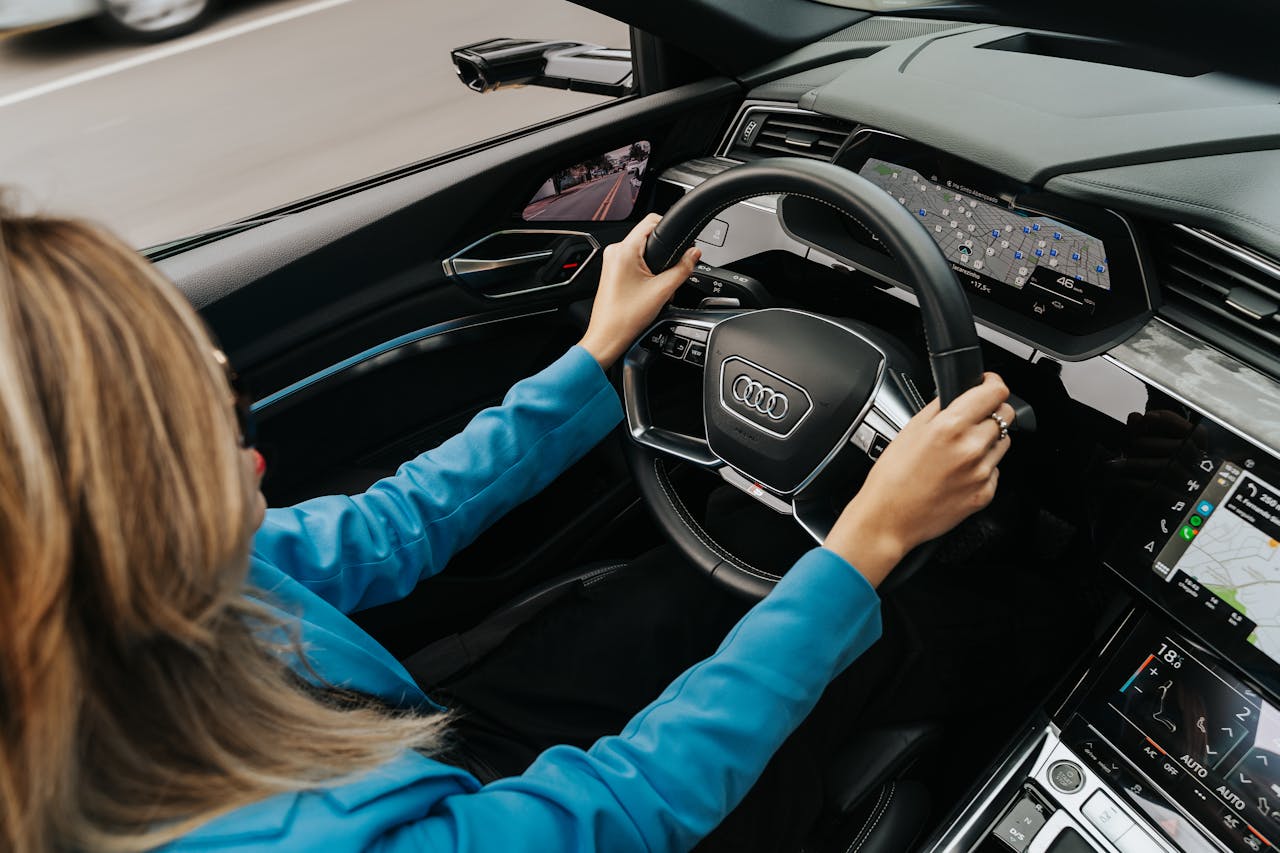
Below is an overview of the most important technological accessories that help the driver, how they work, and why they are useful.
Driver Assistance Systems
One of the most significant technological advances in recent years is driver assistance systems. They reduce the risk of accidents and ease the stress of driving:
Adaptive Cruise Control – this system automatically maintains a safe distance from the vehicle ahead, adjusting speed according to traffic. The driver does not have to constantly worry about the accelerator and brake pedals, which reduces fatigue on long trips and in city traffic.
Lane Departure Warning (Lane Assist) – the system detects unintentional lane departure and alerts the driver with steering wheel vibrations or sound signals. This feature helps prevent accidents caused by drowsiness or inattention, especially on long, straight roads or highways.
Automatic Emergency Braking (AEB) – the system detects obstacles in front of the vehicle and, if the driver does not react in time, automatically activates the brakes. This reduces the risk of collisions during sudden braking or unexpected traffic situations.
These accessories significantly ease driving, especially in stressful situations, and are increasingly becoming standard even in rental cars, particularly in cities and at airports.
Digital Instruments and Infotainment Systems
In-cockpit technology has also evolved, providing the driver with more information and control over the vehicle:
Digital instruments – display speed, engine temperature, fuel consumption, and other important data in real time. Advanced screens often provide visual alerts when attention is needed, such as low tire pressure or obstacle detection. The driver receives all relevant information in one place, without distractions.
Touchscreen displays and voice controls – allow control of navigation, music, phone calls, and apps without taking hands off the steering wheel. Voice commands make driving safer as the driver does not need to look at the screen while operating the vehicle.
Smartphone connectivity (Apple CarPlay, Android Auto) – the driver can use familiar apps for navigation, music, or messaging. This reduces the need to handle the phone while driving, increasing safety and convenience.
This technology minimizes distractions and allows the driver to focus on the road, enhancing overall safety.
Safety Sensors and Cameras
Sensors and cameras significantly aid safety and maneuvering:
Rearview Camera – provides a clear view behind the vehicle, allowing more precise parking and obstacle avoidance. High-resolution cameras often include guide lines showing the vehicle’s path.
Parking Sensors – measure the distance from obstacles and alert the driver with a sound signal that becomes more intense as you get closer. These sensors reduce the risk of scratches and collisions in parking spaces.
Blind Spot Warning – sensors detect vehicles in the blind spot and alert the driver with a signal or blinking LED in the mirror. This reduces the possibility of collisions when changing lanes, especially on highways or narrow roads.
These accessories are particularly useful for drivers who frequently use rental cars from airport fleets, as they facilitate driving in unfamiliar cities and airport parking areas.

Technology for Long Drives and Comfort
For drivers traveling long distances, in-car technology can greatly reduce fatigue and increase comfort:
Adaptive Lighting – adjusts the beam according to road conditions. For example, it automatically dims oncoming traffic lanes or increases illumination in curves. This ensures better visibility at night and in fog.
Automatic speed maintenance and driver fatigue reduction functions (Driver Attention Alert) – monitors driver behavior, such as steering wheel shaking or uneven lane movement, and warns about signs of fatigue.
Air conditioning and heated seats – smart temperature regulation maintains optimal comfort, reduces muscle tension, and increases focus during long drives.
Practical Accessories for the Driver
In addition to integrated technology, there are external accessories that make driving easier and safer:
Navigation devices and phone mounts – assist in route planning, display the route, and alert to speed cameras or traffic jams. Mounts allow the phone to be within reach without disturbing driving.
Dashcams – record driving and can serve as evidence in case of accidents, vandalism, or vehicle damage. Some cameras have additional features like motion detection or recording parked cars.
Bike racks, ski racks, or roof boxes – practical for active leisure, especially in winter. They allow transporting sports equipment without taking up interior space in the vehicle.
Additional safety elements in the car – reflective vests, warning triangles, and first aid kits help in unforeseen situations and ensure the driver can respond safely.
If you decide to rent a vehicle, many of the accessories mentioned above fall under rental car extras, meaning you can request them in advance and significantly ease your journey, especially when driving in unfamiliar cities or airport parking lots.
Technological accessories in cars significantly simplify driving and increase passenger safety. A smart choice of equipment makes traveling more enjoyable and less stressful, regardless of distance or road conditions.





